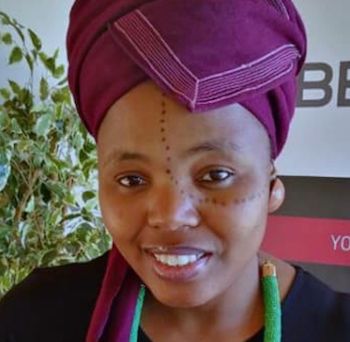Mondeka Mabibini

Summary. Mondeka Mabibini works hard to provide food, clothing, culture, and skills to her impoverished neighbors. During the COVID epidemic, she has raised money and risked her life to offer food to poor communities. She has also managed other projects, including a reading club, a soup kitchen, and an organization to supply shoes to students walking miles to school. Mabibini herself does not get financially reimbursed for any of these efforts.
Profile: When the coronavirus hit South Africa, at least one person was prepared to risk her life in order to help those who were needy even before the virus. Mondeka Mabibini had already launched a number of projects to help young people in particular, but now the situation was even more dire. Settlements were overcrowded, people didn’t have enough food, and very few were able to take the precautions recommended to stay disease-free.
So Mabibini raised money to provide food for about 300 families. She was fully aware of the danger:
“It’s a risk . . . to go out there and engage with people physically . . . I wake up knowing that I can come back affected or infected by COVID-19. Our communities are not complying with lockdown measures to contain the pandemic—which exposes us to high risk of infection.”
But Mabibini is used to putting others’ needs before her own. Her day job is as an administrator for a law firm in Cape Town. But after that is when her real work begins: “I knock off from my full-time job and rush to after-school programmes in the afternoon and then home in the evening after serving my people.”
“Serving my people” encompasses many projects. First there is the UPhawu Community Development program, which focuses on education and art for people in disadvantaged communities. Then there is the Fundani Reading Club, which seeks to engage children who are otherwise exposed to crime, gangsters, drugs, and sexual abuse and to teach them useful skills. On her 34th birthday, Mabibini asked her friends and relatives to buy cooking supplies for her soup kitchen rather than personal gifts; the soup kitchen continues to serve hundreds of hungry children.
And then there is the program called “No More Bare Feet”. Mabibini noticed that many children were walking miles to school—some with shoes full of holes, others with no shoes at all. “Growing up in the Eastern Cape,” says Mabibini, “I know how it’s like to go to school with broken shoes in winter or summer. It doesn’t only affect one physically but kills self-esteem as a student. Other kids would even put their feet in cow dung just to keep them warm for a while.”
So she started a campaign to collect shoes for those children. To this date, she has collected and distributed more than 6,000 pairs of shoes, and that makes the students’ trips to school far more bearable. During the pandemic, she has also come up with an on-line library, and she conducts reading sessions for students in order to make up for some of the time lost in school.
Running all these programs is not easy: “I have to do all the duties like administration, fundraising, and program director because there are no funds to employ people. It’s tough, but I have to keep going on.”
And why does she “have to keep going on?” “I have passion for community work,” acknowledges Mabibini, “especially with regards to children and youth. . . . I will never quit my work at all. It is the purpose of why I was born. It is in me.”
